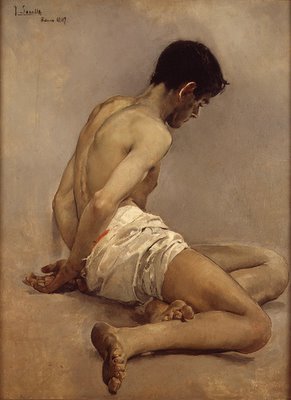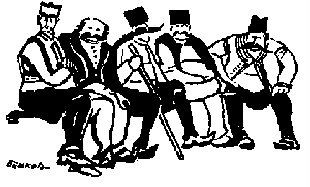Aside from the fact that Joe has been suffering with a bad head cold, we didn’t have a bad weekend. The highlight was our band’s set at Balkan Night, the annual Balkan music and dance festival held in Concord, MA. For us, it was a debut of sorts. We’ve played Balkan Night twice before, but with a different group of musicians. As I mentioned in a
previous post, we’ve had some turnover.
I couldn’t have asked for a better performance. It wasn’t perfect, mind you. I had my share of flubs. In an ensemble setting, however, they’re much less noticeable than when I play solo. We were scheduled to go on at 11:30 pm in the smaller upstairs “kefana” venue. Although there’s not as much room or fanfare as in the main hall downstairs, the upstairs venue is “unplugged,” which works much better for us. We’ve had problems with amplification in the past, especially at gigs like Balkan Night where there are numerous bands each playing 30-minute sets, and each band has only 5 minutes to set up and get sound-checked when it’s their turn to play.
We got there at about 9:30, which gave us plenty of time to chill out, retune, and rehearse a bit more. I myself was anxious to run through some things, because I felt that our pre-gig rehearsal at Mike’s place was a bit rocky. We did have a lovely dinner, however, that our accordion player’s wife prepared for us.
I said a few words to introduce the band and the musicians, which I haven’t always done in the past because of nerves. In my introduction, I forgot to mention that we like for people to get up and dance, which doesn’t always happen in the smaller upstairs venue. About 30 seconds into our first number, however, a group got up to dance a graceful
syrtos to our rendition of Συλιβριανός (Sylivrianos), a tune named for the town of Silivri, which lies west of Istanbul on the Sea of Marmara and was once home to a large Greek community.
Almost immediately I could tell that we were going to have a good performance. For one thing, I was significantly less nervous than I normally am. I think there were two reasons for that. At Mike’s I had a shot of vodka after dinner. Once we arrived in Concord, the clarinet player’s wife had brought her own party in the form of some plum brandy, which she offered me in the basement where we were tuning up. I must say, the liquor helped immensely, you know, to take the edge off. Of course, the other reason I was more relaxed is because I felt much more confident based on our weekly rehearsals, something Skordalia hasn’t always been so good about doing. We’ve been rehearsing weekly with the new guys since January. It paid off.
Our set consisted primarily of instrumental dance tunes from
Lesbos and Asia Minor. We also threw in two δημοτικά (dimotika), which are folk songs from mainland Greece. One of them was a
tsamiko dance, which is a heavy and slow, yet graceful line dance in 6/8. The tsamiko we played was called Πουλάκι Ξένο (Poulaki Xeno, or “foreign bird”), which Joe transcribed from an old 78 rpm recorded by
Yiorgos Papasideris (not the Olympic athlete) back in the 30s. Papasideris was known primarily as a singer of dimotika, but I recently learned that after the influx of Anatolian Greek refugees in the 1920s, he also began to record Smyrneïka. Πουλάκι Ξένο was done in the dimotika tradition. We played it as our fourth number, and one of the dancers had earlier requested a tsamiko, so it was great that we had included one in our set. By that time, the room was really packed, with some more dancers having come in after our first number. The enthusiasm and energy in the room was palpable. It’s exactly what we like to see and feel. It’s why we play music.
Three-quarters of the way through Πουλάκι Ξένο, I played what’s called a
taxim (ταξίμι) on the
sandouri. A taxim is a free-rhythm improvisation that comes either at the beginning of a song or during the melody itself, in which case it needs to fit the rhythm of the song. A taxim can explore a particular makam, or mode, or it can modulate between makams. In the case of Πουλάκι Ξένο, my taxim was in B
Hijaz, which is what the song is in. Hijaz (shown here in D) is a major

scale in which the first and second notes are separated by a half step, the second and third by a step-and-a-half, and the third and fourth by another half step. The very eastern sounding tetrachord (progression of four notes) that results is very common in Greek and Middle Eastern music. I also played a taxim during our second number, which was a syrtos dance from Asia Minor. My taxims are not improvised
per se. That is, I work them out in advance. I am not nearly skilled enough as a musician, nor do I have a good enough knowledge of makam, to produce a spontaneous taxim
on the spot. I’m working on that.
B, the clarinet player, also performed a taxim during our final number, a syrtos dance from Lesbos called Γεραγότικος (Geragotikos), also in Hijaz. He was worried that his taxim wouldn’t sound Greek enough, since he’s a klezmer clarinetist. During his wonderful taxim, at which point there were so many dancers that they were beginning to knock over our music stands as they circled by us, I shouted out “Γειά σου, κλεζμεράκι μου!” which loosely translated means, “Bravo, my little klezmer!” It’s very common for Greek musicians to shout things out to each other during taxim. As soon as I said it, one of the musicians, obviously a Greek, responded by shouting out “Γειά σου, σαντουριέρη!” which means “Bravo, sandouri-player!” I looked up, but the line had already swept past me, so I’m not sure who it was, but I was happy to hear it.
This was the first time in a while that I didn’t finish a set feeling like I wanted to kill myself. In the past, we’ve always received positive feedback, even when I felt like we sucked. This time around, we sounded much better to my ear than Skordalia has sounded in the past, which meant that the accolades we received on Saturday meant much more to me than in the past when I've felt we played poorly. I know that the regular rehearsals made a huge difference in both the overall quality of our playing and in our level of confidence as well. There’s nothing worse than going into a gig feeling
under-rehearsed. A year ago I was talking to a band member from a group called
Rakiya, and he told me that they rehearse every week. I decided then that a weekly rehearsal would be our goal.
We’re scheduled to meet this Wednesday. Joe and I are already beginning to plot out new songs for us to learn, new directions, new arrangements. I’ve got a great accordion-sandouri duet from old Stamboul that K and I will start working on. Meanwhile, Joe has been busy transcribing Τσακιτζής (çakici in Turkish), a Smyrneïc tune known in both Greek and Turkish circles. I also spent part of yesterday learning some new melodies that I hope to work on in with the ensemble in the not-too-distant future. I’m very excited about the direction we’re moving in as a band, and we couldn’t have found a nicer group of guys to be moving with.
 Last night K, Joe and I went to the Museum of Fine Arts to see Istanbul Tales (Anlat Istanbul, 2005), which opened The 5th Boston Turkish Film and Music Festival. I likened the film to a Turkish Pulp Fiction, in which the world of organized crime and mob violence were prominent themes and in which seemingly disconnected stories were woven together. In telling the different stories, Anlat Istanbul, which was set amidst the backdrop of Istanbul, combines uniquely Turkish elements with elements and a narrative structure that were borrowed, at least in part, from well-known children’s fairytales. The film is not a retelling of these stories. Rather, each of the film’s five stories is a dark and shadowy reflection of the original tale it mirrors.
Last night K, Joe and I went to the Museum of Fine Arts to see Istanbul Tales (Anlat Istanbul, 2005), which opened The 5th Boston Turkish Film and Music Festival. I likened the film to a Turkish Pulp Fiction, in which the world of organized crime and mob violence were prominent themes and in which seemingly disconnected stories were woven together. In telling the different stories, Anlat Istanbul, which was set amidst the backdrop of Istanbul, combines uniquely Turkish elements with elements and a narrative structure that were borrowed, at least in part, from well-known children’s fairytales. The film is not a retelling of these stories. Rather, each of the film’s five stories is a dark and shadowy reflection of the original tale it mirrors. 











































